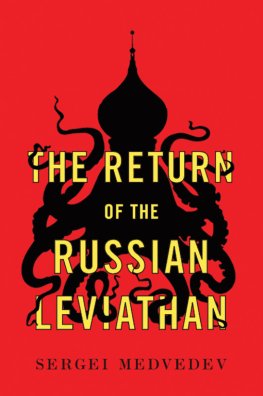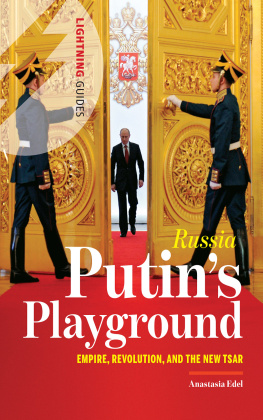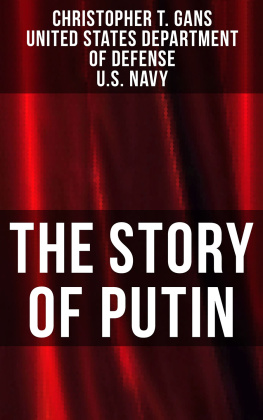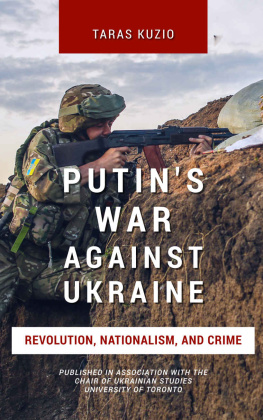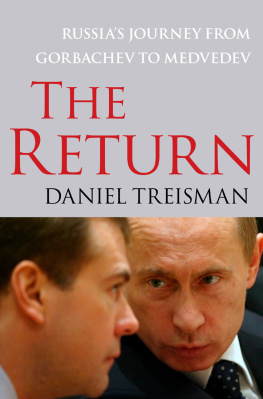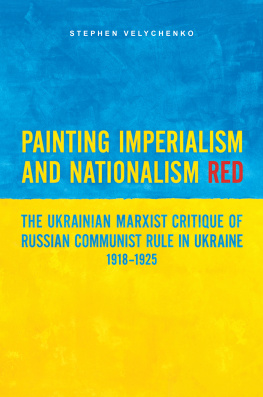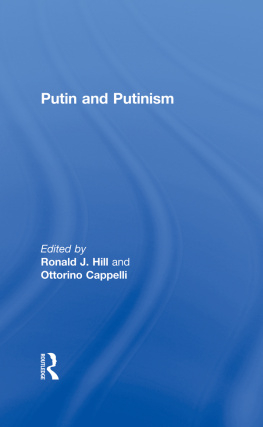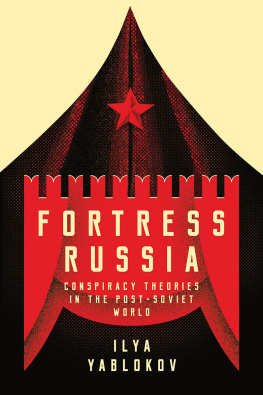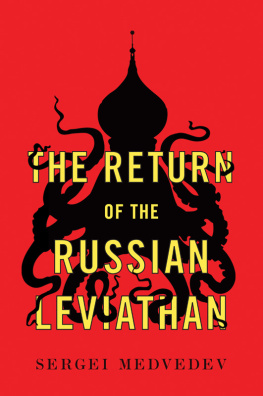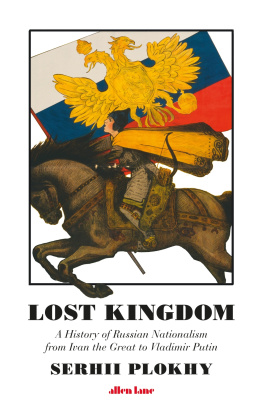Sergei Medvedev
THE RETURN OF THE RUSSIAN LEVIATHAN
Translated by Stephen Dalziel
PREFACE TO THE ENGLISH EDITION
On 23 February 2014, President Vladimir Putin stood on the podium of the Fisht Olympic Stadium in Sochi and presided over the closing ceremony of the Winter Olympic Games. For the first time in many years, Russia had won, coming top of the unofficial medal table. The world had yet to learn of the doping scam that was behind the triumph in Sochi; at that moment it was Putins personal victory. He had shown the world the Russia that he had built, with its pretence at global leadership, its vertical of power, its skyscrapers in the Moscow City business area, its victories on both the sporting and the gas fronts, and its fabulously expensive Winter Olympiad, which had been put on in a subtropical region.
That very same morning, 23 February, the decision was taken in the Kremlin to annex Crimea from Ukraine. Russian special forces, spetsnaz, wearing unmarked uniforms, began to land in Crimea and seize strategic points. They were referred to as little green men. Within a month, on 17 March, Crimea declared its independence, and the next day it was incorporated into Russia. Russia fell into a spectacular downward spiral from its Olympic heights. It went from being a triumphant country and member of the G8, to being an outcast, a country that flew in the face of international law and the world order, one by one ripping out the threads that had tied it to the outside world, destroying all the structures of normality and globalization which Russia had built up in the quarter of a century since the collapse of the Soviet Union.
Today, almost five years later, there is no end in sight to this freefall. On 18 March 2018, on the fourth anniversary of the annexation of Crimea, Vladimir Putin was re-elected president by an overwhelming majority of the population for a further six-year term up to 2024. He has built his rhetoric on nationalism, militarism and an aggressive confrontation with the West. Russia has become a rogue state, constantly raising the stakes in its symbolic confrontation with the West, and turning its own population into the hostages of its geopolitical ambitions. But the start of this deadly spiral was laid down on that day in February 2014 with the decision to annex Crimea. Now we are all living in a post-Crimea world.
When I say we, I include also the readers of the English-language edition of this book. The toxicity of this new Russian regime instantly crossed the borders of Russia and Ukraine. As early as 17 July 2014, during a military operation started by pro-Russian separatists in the east of Ukraine, a Malaysian Airlines Boeing aircraft, flight MH17, was shot down by a BUK air defence system brought in from Russia. All 298 passengers and crew, from ten different countries, perished. Then we had the interference by Russian hackers in elections in the USA and Europe; an attempt to bring about a coup dtat in Montenegro; intervention in the civil war in Syria and the barbaric bombardment of Aleppo and other towns, with subsequent huge loss of life. Next, in March 2018 in the English city of Salisbury, there was the poisoning and attempted murder of the former Russian spy, Sergei Skripal, and his daughter, Julia, using a nerve agent. You couldnt find a better (or perhaps that should be a worse) metaphor for the toxicity of the Russian regime.
This book is an attempt to understand where this regime appeared from and how it got a grip on power. Is it simply a logical continuation of the post-Soviet transition; or is it a sharp break with the script, thanks to the will of one man? Is it a deeply Russian invention; or is it the Russian version of a global trend towards de-globalization and a return to the idea of the nation-state, with its old grievances and unfulfilled ambitions, part of which was the Brexit vote and the election of Donald Trump as President of the USA?
Undoubtedly, Vladimir Putin has become the harbinger and the personification of the global return of the state. But on top of this he turned to the Russian tradition of autocracy, which goes back some 600 years, to the time when the state of Muscovy was established as the successor to the Golden Horde. As a historian, this has been fascinating to observe. I have watched as the traditional forms of power and slavery have returned; totalitarian discourses combined with Soviet figures of speech; the practice of state distribution and the rituals of class in society; and all of this linking together the Brezhnev period, Stalinism, serfdom, and practices from the time of Ivan the Terrible. The whole history of Russia is being played out before us once again, repeating most of the social, political and economic matrices that we have known; and it seems as if Russia is once again sliding back into its old historic rut.
Under Putin, the first decade of the twenty-first century was a time when the state returned in all its former glory: the elite enjoyed their privileges while elections were repressed; the law and the ordinary citizen were regarded with disdain; there was the rhetoric of a great state along with wars for an imperial heritage. The key period was Vladimir Putins third term as president, from 2012 to 2018. This was the time when we saw the repression of the peoples protests which had occurred in the winter of 201112, the passing of dreadful repressive laws (such as banning foreigners from adopting Russian children, or the outlawing of homosexual propaganda), the annexation of Crimea, wars in Ukraine and Syria and the waging of an undeclared hybrid war against the West. In short, the portal into the past opened up, and the political arena was taken over by the dinosaurs of autocracy and imperialism.
And it was in these years of Putins third term, alongside the establishment of this revanchist, repressive regime in Russia, that I wrote the essays which make up this book. These are pages from the modern history of Russia, variations on the main theme: the return of the state and its war against different areas of civil, territorial and symbolic autonomy. This is a chronicle of the states attack on the individual, the assertion of its sovereign rights on our territory, our body and our memory.
The book is divided into four parts, each of which describes one of the wars being waged by the state:
1. The War for Space: from the battles for Moscows squares and boulevards taking place between the authorities and the protest movement, to the symbolic actions of the gathering in of Russian territory, such as plans to militarize the Arctic; from the post-imperial adventures in Crimea and the Donbass to the neocolonial war in Syria.
2. The War for Symbols: the battle for symbolic dominance through various locations, signs, rituals and performances by the authorities: the Kremlin and Red Square portrayed as sacred sites; military parades and patriotic parks as sanctuaries of sovereignty. Russian strategic nuclear missiles have become one of the main symbols of power: paraded through the streets of Moscow; pictured on popular tee-shirts; threatening the West from giant screens during Putins pre-election speech in March 2018. They have become the symbolic basis for the new Russian self-awareness.
3. The War for the Body: this is a new area of state regulation, which has been particularly noticeable in the second decade of the century. It refers to the practice dubbed biopolitics by Michel Foucault state interference in the private lives of citizens, from their consumer habits to their sexual and reproductive practices. In this category we have the battles with gay propaganda and foreign adoptions; religious education in schools; and the destruction of Western food products that came under Russian sanctions. The authorities are poking their noses into places that were previously considered the domains of our private lives: the bathroom, the bedroom, the kitchen even looking inside the fridge and trying to regulate our bodily functions, disguising this as a battle for demographics and a claim of a sort of Russian sexual sovereignty.

